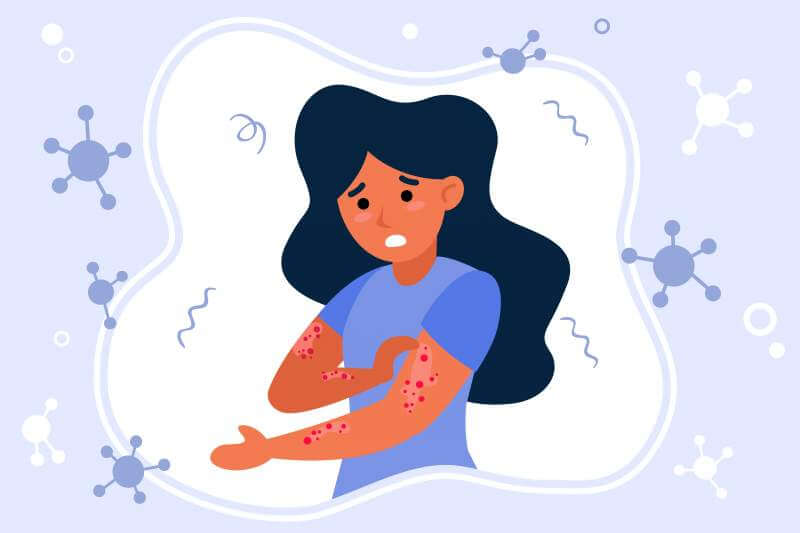Vasculitis refers to inflammation of the blood vessels. Inflammation is your immune system’s response to the normal reaction to injury or disease. It causes swelling and can help the body manage attacking germs.
In any case, in vasculitis, for reasons unknown the immune system affects normal veins, making them become enlarged and tight.
Vasculitis can range from a small skin problem to a more serious disease that affects organs such as the heart or kidneys. Vasculitis can affect one of three different types of blood vessels.
Arteries : Transport blood from the heart to organs (such as the kidneys) and tissues throughout the body (for instance skin)
Veins: return blood to the heart
Vessels: small vessels between the arteries and the veins where oxygen and different materials pass from the blood into the tissues.
The organs and tissues in your body need an ordinary blood supply to work appropriately. Aggravation causes swelling of the vein dividers, lessening or in any event, impeding the progression of blood to the tissues and organs. Vasculitis can cause a scope of indications and potential entanglements. The measure of harm vasculitis causes relies upon what portion of the body is influenced. The bigger the influenced veins, the more harm there might be; the more significant the influenced body tissue, the more genuine the harm will be. The dividers of influenced veins can grow and swell (this is called an aneurysm) and may even explode, causing draining inside your body. Aside from the harm to the actual vein, this can prompt harm to the tissues or organs which are provided by the vein.
Vasculitis can happen out of nowhere in somebody who has recently been totally well – when it happens all alone, specialists call this essential vasculitis. Vasculitis can likewise happen close by different conditions (counting rheumatoid joint inflammation, lupus or Sjögren’s disorder, and Inflammatory Vasculitis), in which case it’s known as optional vasculitis.
Symptoms of Vasculitis:

At the point when any piece of your body is aggravated, it expands and is awkward or excruciating. With many sorts of vasculitis the expanding is inside the body and you can’t perceive any of the indications outwardly.
Vasculitis takes various structures as on which veins are influenced, and side effects change. Many individuals with vasculitis feel unwell and have fever, sweats, exhaustion and weight reduction. These can be the main side effects experienced, so be seen by your GP.
Different side effects differ as per what piece of the body is influenced, for instance:
Skin: Vasculitis in the skin causes spots that can explode, leaving open bruises (ulcers). At the point when vasculitis just influences the skin, long haul impacts aren’t generally genuine, and indications ordinarily clear up whenever aggravation has settled.
Nose: Vasculitis causes the nose crusting and nosebleeds. Here and there the state of the nose can change.
Fingers and toes: a few groups with vasculitis experience Raynaud’s wonder, where the fingers or toes go white or blue and may shiver or damage when presented to cold conditions.
Eyes: a few sorts of vasculitis can out of nowhere influence your vision or cause your eye/s to become red or excruciating. See a specialist rapidly if this occurs. If you experience any symptoms of vasculitis you can always consult the best vasculitis doctors.
Diagnosis of Vasculitis:
There are many tests that might help analyze the condition.
Blood tests might be utilized to gauge aggravation – for instance, the erythrocyte sedimentation rate (ESR) or C-responsive protein (CRP).
A full blood check can assist with building up whether you have weakness and regardless of whether you have ordinary degrees of white platelets (which battle contaminations) and platelets (which are engaged with coagulation).
Liver capacity tests may likewise be completed to check how your liver is functioning.
In the event that you have vasculitis alongside different conditions, like rheumatoid joint pain or lupus, then, at that point blood tests may be utilized to evaluate how dynamic these different illnesses are. Blood tests can gauge the degree of rheumatoid factor in rheumatoid joint inflammation, or the degrees of supplement (a catalyst framework or gathering of proteins in the blood) and antibodies in lupus. This can help the doctors to understand the condition and provide the best Rheumatoid Vasculitis Treatment.
Blood tests might be rehashed now and again to check how your condition is reacting to treatment.
Treatment:
The medicines prescribed by the Best Vasculitis Doctors will rely on which veins and organs are influenced, just as how much body tissue is influenced. In the event that the vasculitis just influences the skin, it could be sufficient to treat any basic disease or to eliminate the medication that sets off the vasculitis. Notwithstanding, by and large, drug treatment will be expected to control the sickness and its manifestations and to stop or restrict the harm brought about by vasculitis.
The two fundamental kinds of medication used to treat vasculitis are steroids and immunosuppressant specialists. Both demonstrate to hose down the insusceptible framework to lessen the strength of its assault on the tissues of the body. On the off chance that you have vasculitis influencing the huge veins, you’ll likely be given steroid tablets. These are extremely viable for goliath cell arteritis and Takayasu arteritis, and frequently immunosuppressive specialists aren’t required for these conditions.
Assuming you have vasculitis influencing little and additionally medium-sized veins, you may just need a little portion of steroids to control it.
Nonetheless, you might require a blend of steroids and immunosuppressive medications, presumably more than quite a while, particularly if vasculitis influences inside organs. For some kinds of vasculitis, including the ones that affect the kidneys and other organs the treatment is usually done in stages.
Follow a healthy lifestyle to avoid getting affected by vasculitis.
